Said and Done
DECEMBER 2021
MIT SCHOOL OF HUMANITIES, ARTS, AND SOCIAL SCIENCES
QUOTABLE
“Over the next ten years, climate change will drive over 100 million people to adapt where and how they live, regardless of the success of mitigation efforts. For those adaptations to succeed, there must be a concerted collaborative effort between frontline communities and institutions with the resources to facilitate adaptation."
—Eric Gordon, Co-Director, Civic Design Initiative
SOLVING CLIMATE
COMPARATIVE MEDIA STUDIES/WRITING
Conversations at the Frontline of Climate Change: The Civic Design Initiative
Novel communications infrastructure from the CMS/W-based Civic Design Initiative (CDI) aims to support communities on the frontlines of the climate crisis. The Deep Listening Project, CDI's lead effort, works with an initial group of frontline communities in Nepal, the US, and Canada. The goal is to co-design technologies that enable institutions and frontline communities to collaborate towards effective, just climate adaptation. The project is one of 28 finalists in the MIT Climate Grand Challenge."
| Visit the CDI's Deep Listening website
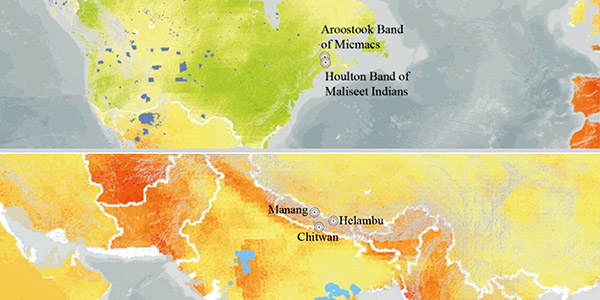
Locations of frontline climate communities collaborating with MIT CMS/W on the CDI/Deep Listening Project
POLITICAL SCIENCE
Can the world change course on climate? | Nazli Choucri
MIT Political scientist Choucri, an international relations expert, discusses challenges and hopes for global coordination on sustainability and climate issues — and the role of political science in the process. Along with a clear-eyed assessment of our formidable climate challenges, Choucri describes her sources for hope and optimism.

"There are signs that the climate change issue is making a slow but steady shift to 'high politics' — those issues deemed vital to the existence of the state."
_________________________________________________
ABDUL LATIF JAMEEL POVERTY ACTION LAB, NORTH AMERICA
What can US state and local governments do in response to climate change?
This recap of a webinar hosted by JPAL North Amercia describes how localities can use data to shape environmental policy.
Commentary
RESOURCE
MIT's Council on the Uncertain Human Future
The Council on the Uncertain Human Future at MIT, catalyzed by the SHASS Dean's Office team in collaboration with MIT Environmental Solutions Initiative, convenes small groups for a series of conversations to reflect deeply on the climate crisis and its implications for our lives. All members of the Institute community are welcome to participate.
Learn more
RESEARCH + NEW WORKS
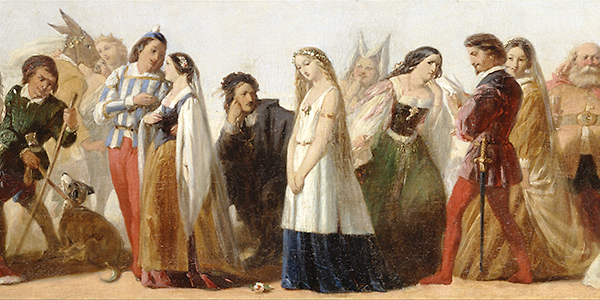
Procession of Characters from Shakespeare's Plays; circa 1840; unknown artist; Yale Center for British Art; public domain
LITERATURE
Shakespeare Studies Volume 49 | Edited by Diana E. Henderson and James Siemon
This peer-reviewed annual volume features the work of performance scholars, literary critics, and cultural historians across the globe. The journal focuses attention on Shakespeare and his contemporaries, and also embraces studies of sociopolitical, intellectual, and artistic contexts well beyond the early modern English theatrical milieu.
About | Diana Henderson webpage
MUSIC + TECH
Harmonix keeps innovating | Eran Egozy, Alex Rigopulus
The MIT spinout has been releasing iconic video games for more than 25 years. “That’s what the company is constantly trying to do — creating new kinds of compelling music experiences," says Eran Egozy ’93, SM ’95, Professor of the Practice in Music Technology, who co-founded the company with Alex Rigopulos ’92, SM ’94.
Story via MIT News
PHILOSOPHY
Speech and how we live | Justin Khoo
Khoo blends philosophy and linguistics to examine the way we communicate about politics, values, knowledge, and taste. As such, his work provides tools for thinking about how individuals and human societies can live together in more harmonious ways.
Story by Peter Dizikes, MIT News | Related: Applying philosophy for a better democracy
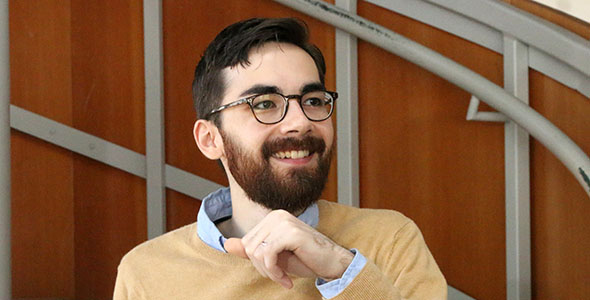
MIT philosopher Justin Khoo; photo by Allegra Boverman
INSIDE THE CLASSROOM
ECONOMICS
The power of economics to explain and shape the world
In 14.009/Economics and Society's Greatest Problems, a first-year class taught by Nobel laureates Abhijit Banerjee and Esther Duflo, MIT students discover how economics helps solve myriad societal issues.
Story by SHASS Communications
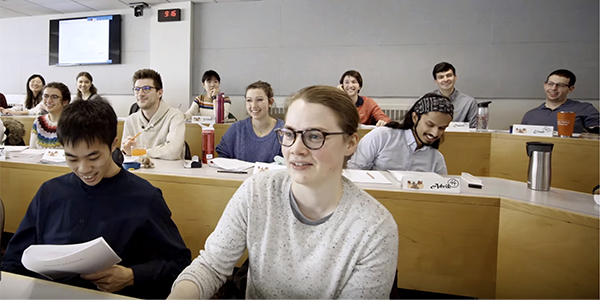
Students in an MIT Economics classroom
“We want students to get excited about economics because this is a field that can help us address some of the biggest problems society faces.”
— Abhijit Banerjee, Nobel laureate, Ford Foundation International Professor of Economics

MUSIC
Anat Cohen at MIT | 2020-21 Virtual Visiting Artist Residency
Virtuoso musician Cohen expanded on her previous collaborations with MIT during her 2020-21 virtual residency, helping students develop their personal approach to sound and improvisation through classical, jazz, and world music.
About | Video: Anat Cohen at MIT | Anat at Lincoln Center
MAKING A JUST SOCIETY
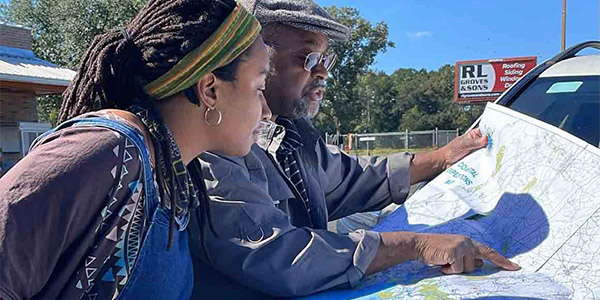
KSJ Fellow Asha Stuart and Gullah native Kenneth Hodges locate Gullah communities in Beaufort, South Carolina
KNIGHT SCIENCE JOURNALISM AT MIT
Journalism as a means for social justice | Filmmaker Asha Stuart, KSJ Fellow
Stuart's work sheds light on the struggles of people living in marginalized communities and facing issues of inequaility. She has covered stories for Time, Politico, and PBS among other platforms. As a KSJ Fellow, Stuart is producing a new documentary on environmental injustice in the US.
Story: Meet Asha Stuart | Doc: Inside a Lost African Tribe | Stuart Website
HISTORY
Family systems and economic development | McCants and Seligson
"Family systems shape social institutions, yet they are rarely considered in histories of economic development." In this paper, the authors show that several harmful social conventions are more common in polygamous societies than in monogamous societies, and argue that this "has significant consequences for social, institutional, and economic development."
Paper | Anne McCants website | Related: Clues from climate chnage in history
MIT SHASS DIVERSITY, EQUITY, AND INCLUSION
Update on our Program
Visit the SHASS DEI websection for new stories and updates on plans and progress.
Main Page | Gallery | Timeline | MIT ICEO website
HOW TO OFFSET ECONOMIC SHOCKS
ECONOMICS | TRADE
The long afterlife of the “China shock” | David Autor
Economist Autor's new research shows that the U.S. locales hammered by open trade with China have not yet rebounded. "The forward-looking lesson is about adjustment for unemployed workers and hard-hit areas," Autor says. "Because we’re not done with it. If China’s exports were encased in lucite tomorrow, we’d still have lots of economic shocks going forward."
Interview by Peter Dizikes | Paper: On the Persistence of the China Shock

Q: What are the best policies to help people and places affected by these kinds of shocks?
Autor: There are different levels of policy. Knowing what we know now, I would have done China trade policy more gradually. And we ought to have much better economic adjustment assistance. A third angle of attack is place-based policy: Subsidized training, and policies that stimulate employers to create local jobs. Another approach is investments in people who need a leg up in the labor market, for example: a high-intensity STEM training program for people without college degrees, So, one level is about trade and policy. One is about adjustment systems. A third is about place-based policy. And a fourth is to improve labor market opportunity for people without college degrees.
EXPLORE
Follow us
Subscribe to Said and Done
10 issues a year
Media + Awards Digest
Current coverage
Making a Better World
Browse 12 Research Sectors
Diversity, Equity, and Inclusion
Browse the Websection
Making a Just Society
Explore the Resources
Solving Climate: Humanistic Perspectives
Browse the Commentaries
Perspectives for the Pandemic
Explore the Series
Ethics, Computing, and AI: Perspectives from MIT
Full Series
Computing and AI: Humanistic Perspectives from MIT
Full Series
MIT Climate website
A major source of research, innovation, and discussion
Join us!
SHASS on MIT News
Research and Features
MIT Campaign for a Better World
Story | Join Us
Published by SHASS Communications
Office of the Dean, MIT School of Humanities, Arts, and Social Sciences
Editor and Designer: Emily Hiestand
Publication Associate: Alison Lanier
Published 15 December 2021





